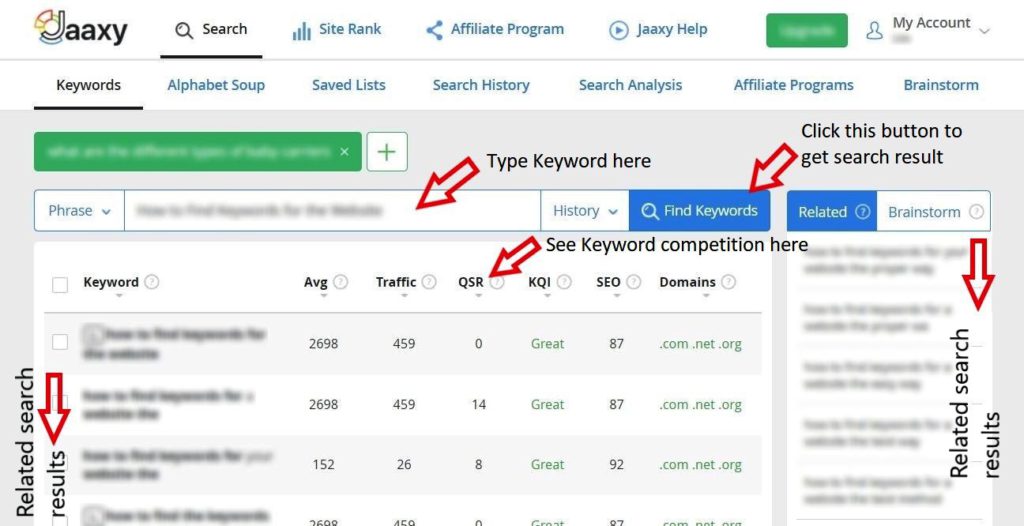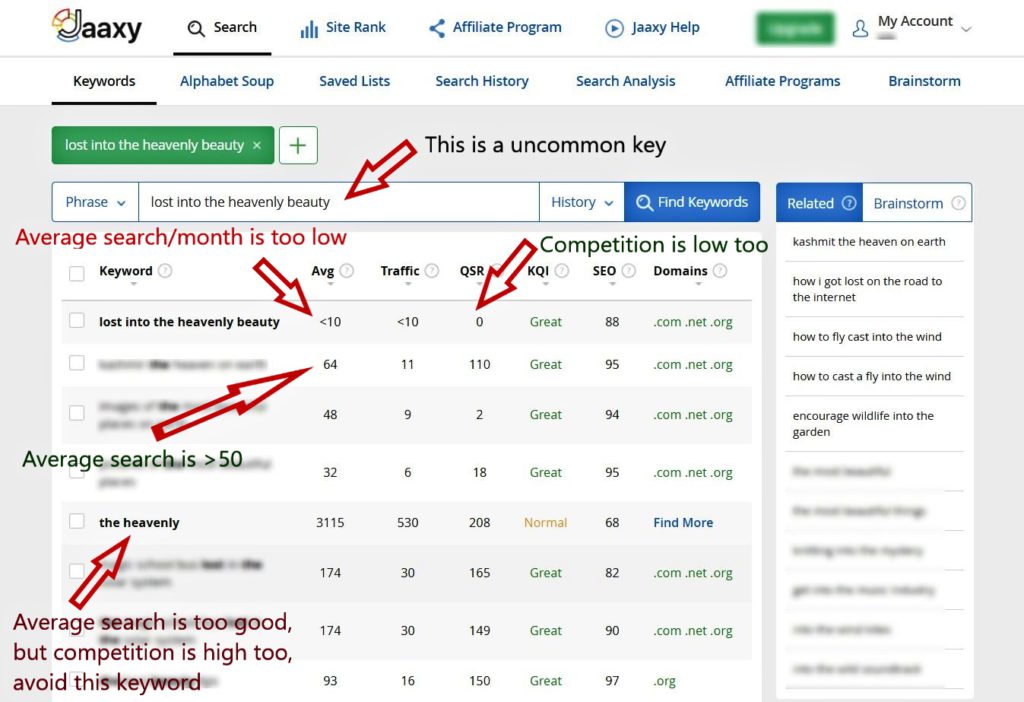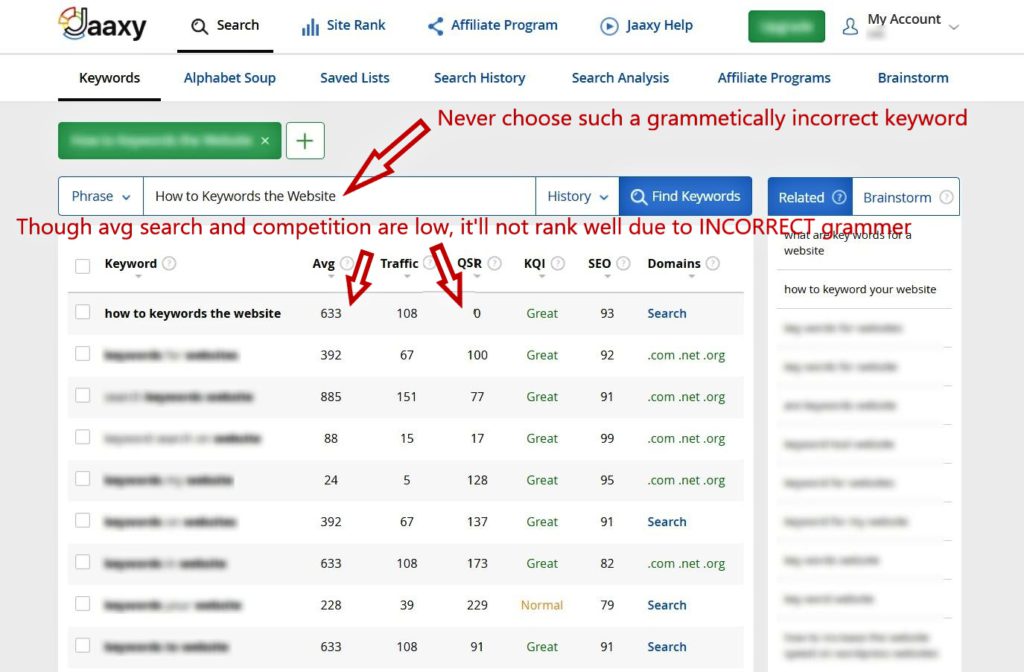“How to Find Keywords for Website Content?”… this is one of the most demanding questions among newbie bloggers’ all over the world, especially when they slowly start learning about the keyword concept.
Keywords are the seeds of your online business platform/ website, and incorporating the right keywords is the art that brings you much-demanding success. As a beginner, it is very common to have no/less idea about keyword research. I am glad to help you out.
To be honest, I have noticed not only beginners but also many intermediates are suffering from keyword-related issues; in fact, recently I received several such queries in my personal mailbox. So, I took it very seriously, and talk to everybody to figure out the general problems they are facing.
What I find… The way of keyword search is either wrong or very old dated. Also, I have noticed, some intermediates use complicated keyword tools and get puzzled eventually; then what’s the point to use that tool that is not solving your problems!
I am not saying you are a bad writer or a bad composer, but unless you select and use keywords in a proper way, it is very difficult to survive in the virtual world.
To get success in the online world, firstly it is important to understand the relationship between keywords and SEO (Search Engine Optimization), secondly, selecting the right keyword tool that is easy to use and completely error-free, and thirdly, choosing the ideal keywords for your website content. Lets’ begin how to!
Give me 5 minutes… You’ll realize the beauty of keywords
In the present decade, internet world is over-exposed, and no one wants to leave this opportunity. Nowadays, people from almost every profession are trying to make money online by sharing their expertise; writers, travelers, vendors, trainers, engineers, doctors, teachers, and people from many other professionals have already started their online journey, but the question is how many of them became successful thus far?
I’d say less than 10%. Do you know why?
Simply, due to lack of knowledge; although people start with lots of enthusiasm, most of them slowly disappear from the online world due to continuous failure. let me say what happens in general.
As I mention, people jump into this mission without having any proper knowledge; in fact, most of them want to make money online but don’t want to invest in learning the strategies.
If you consider the website-based online business (most profitable), you should know, there are several facts involved behind the success, and the first and foremost factor is keyword magic. If you incorporate no keywords or wrong keywords, your website must suffer from no traffic to low traffic, because search engines can never locate your site content to rank the website. Keywords, websites ranking, website traffics, search engine optimization (SEO), and online success are closely related to each other, so you must have to take care of those in a consistent manner. In case, you are not an expert, you have to take help from the experts.
You know, struggling with an unranked website is really frustrating. And if you are a sufferer, your frustration forces you either, (1) to stop your online journey or (2) search for a proper solution. I’m glad you didn’t give up but looking for a better solution.
Keywords are beautiful things; if you select proper keywords for your site content, search engines start to recognize your website very quickly and fall in love with your website. As a result, your website will be flooded by quality traffic and you’ll be the ultimate gainer.
Let’s uncover, how to find keywords for website content.
Remember the rule of 3 pillars and generate the best keywords
If you remember the rule of 3 pillars, you are halfway done. You must focus on,
- Low competition keywords (at least below 150)
- High Keyword search traffic (must be at least 60)
- Keywords must carry a sense
Keep reading the explanations below, things will be crystal clear to you.
1. Low Competition Keywords
The meaning is very simple; a low competition keyword competes with the least number of websites’ content. In the alternate version, search engines host less content having a low competition keyword.
This is the most important criterion to choose a keyword. So, your primary focus should be to select the lowest competition keyword.
If there will be too much content on the internet with your chosen keyword, your content can never rank on the search engine. Because other contents are already sitting on the top of the search result, and with a new website, it is very difficult to replace them.
No Rank in Search Engine = No Traffic = No Earning = Frustration
I’m clarifying the fact using one of the very renowned keyword research tools, namely Jaaxy. This tool can produce the result of keyword competition very efficiently compared to many other similar tools. I personally use Jaaxy for research-purpose before creating any website content because I achieved massive improvement in my website ranking since I started using it.
If you use Jaaxy, you can see the term QSR (Quoted Search Result), which indicates the value of keyword competition.
The ideal QSR value is below 200, but I recommend selecting keywords having competition lower than 100 to rank well, especially if your website is absolutely new. Lower the value of QSR, the higher the chance to rank in the search engine.

2. Keyword search traffic must be at least 50
Without traffic a keyword is useless. If your selected keyword is not popular in the search engine (people never search with the term), you’ll never get traffic to your website.
Authors often love to create a headline that is rhythmic, poetic, and nice-looking. These types of headings are great choices for books or a story but for not for blog articles. For your website content, you have to search for a title that has popularity in search engines.
So you need to be realistic to select a keyword. Yes, you can create a nice-looking title, but must include the keyword phrase within it.
Another thing you need to focus on: Average search/month vs keyword competition.
Normally, uncommon keywords are low competition keywords (QSR value is even ‘0’ sometimes), which means there is nothing on the internet with this keyword. But don’t be delighted to see a low competition keyword. Besides, you must check the traffic (average search/month) also. Most of the time you’ll find there is no traffic at all.
No Traffic = No earning = Frustration
So, you can not choose a keyword for your website, which represents low competition and very low traffic. An ideal keyword must have at least 50 searches per month.
In Jaaxy, traffic per month is represented by the term ‘Avg’.

3. Keywords must carry a sense
The title of the article is “How to Find Keywords for Website Content“. You can see I have chosen a keyword that grammatically makes sense and also the keyword phrase is included within the title.
How would it be, if I had chosen something like, “How Find Keywords Website“? Does it grammatically make sense? Would you like it? Would anyone like it? – “No”
You are creating content for your audiences. If they are not impressed with the very first line (the title) of your article, they’ll just leave your website, because of the awkward feelings. You’ll be losing traffic as well as ranking.
Notably, bots within Search Engines (SE) also don’t like a keyword/sentence which is grammatically incorrect.
Meaningless keyword = Decrease Traffic + Hate from SE = No ranking = No earning = Frustration
So, you always need to select a keyword that makes sense.

The keyword research tools
You’ll get many keyword research tools on the internet. Few don’t produce faithful results and few are pretty perfect but very expensive. You must select the right one. Without perfect results, you’ll be selecting the wrong keywords, and your website will continue to trouble.
I personally use Jaaxy as my keyword research tool, which is easy to use. I find, it can generate very accurate results, and also, I am continuously getting high traffic since I started following the outcomes from Jaaxy.
Other than Jaaxy there are few more keyword research tools in the market, such as Soovle, Ahrefs, SECockpit, Google Keyword Planner, etc., you can try any of these.
An evergreen online platform offers free access to Jaaxy, along with many other facilities. This is a very renowned platform for providing the best ever training on online marketing and also host your profitable online business. If you are interested you can check out the following link.
Wrapping up
Hope, now you have a clear idea about how to find keywords for website content.
Would you like to try yourself now?
If you want to try, you can use the tool below. Search for the ideal keywords for your website; you must follow the “Rule of 3 Pillars” as I described above. I can assure you, you’ll get success if you follow the rules.
If you have any further questions you can drop them in the comment box below. I’ll be more than happy to help you out.
If you like this tutorial social sharing will be highly appreciated.
Thanks for your visit.
Have a nice day.



I love using Jaaxy as a keyword research tool. But you have made it that much more simple and how to research keywords. The only issue I have when researching keywords is how to do it.
I always find great keywords, but then realize they don’t rank as well as they should. By following your guide, I think I’ve learned quite a bit today.
I think my problem was finding keywords which didn’t make sense, today I have learned that those keywords will never rank because nobody really searches like that. People actually type on whole sentences when searching for a solution to their problem. That’s exactly how I will start to write my posts. Thank you for this really in-depth keyword post.
It is great to know you find this post a helpful one and many of your keyword related problems have been solved from this article.
You have understood most of the things, but I like to modify your understanding of the keywords that don’t make sense.
People always do not search by a full sentence, but also search by phrases. We consider those phrases as our content keywords. Sometimes people also search with a phrase that doesn’t make a proper sense, such as, “round necked t-shirt women”. Originally it should be “round necked t-shirt for women”.
Maybe in Jaaxy result, you’ll get very low competition (QSR) for the first one which is grammatically wrong, and high competition for the phrase which is grammatically right.
In that case, I’d suggest you avoid the first keyword which is grammatically wrong, because this will reflect on your SEO. Google don’t like wrong grammars and you can’t avoid the red eye of Google.
Best wishes.
Great article about Keywords.
You are absolutely right about the three pillars. And your use of one of the best affiliate marketing keyword tools only makes understanding much better.
When carrying out keyword research with this tool, I take all the 3 pillars into account and also go an extra mile to make sure that my selected keywords will not be difficult to rank for, by taking a closer look at the SEO column. I usually focus on the figures having 90 and above.
What about you? Do you also consider the SEO column when carrying out your keyword research? Well written article. Great job.
Yes, I, of course, keep SEO in a major consideration, but all three pillars are important at a time. If the SEO in 99 but the average traffic is less than 40, then it is better to avoid that one.
Sometimes you’ll see the average search is very high, SEO is also in the 90s, but the QSR is high too. What do you do then? Just avoid the keyword.
Your first focus should be average traffic and then QSR and finally SEO. Normally, if Average traffic is high and QSR is low, then generally SEO seems to be high. And never forget to consider the grammar, because it will reflect on SEO.
Hope you understand.
Thank you for visiting here and send your query.